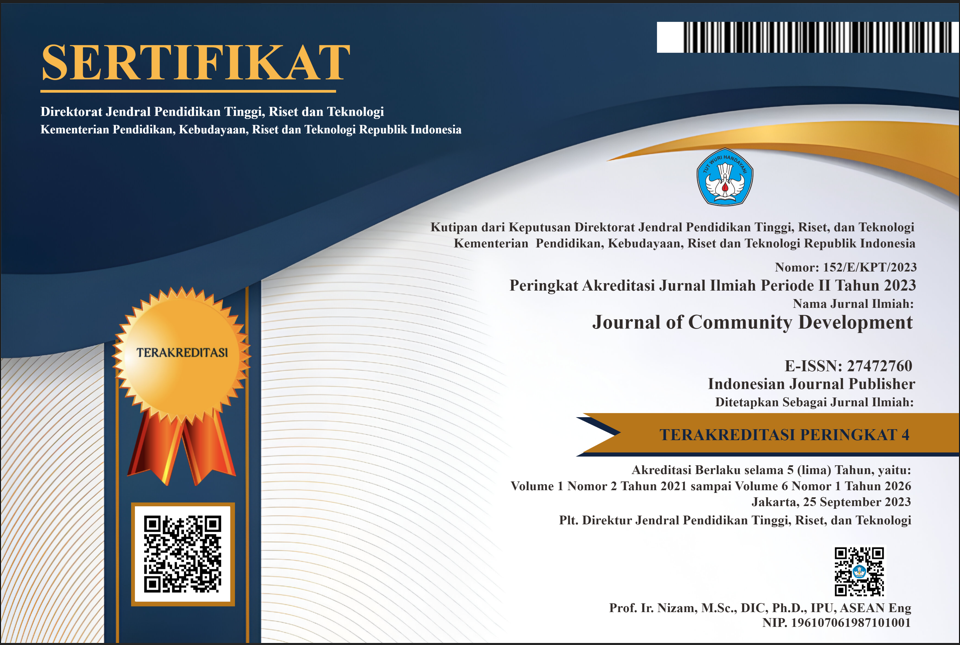Pelatihan Penulisan Position Paper Model United Nation Bagi Mahasiswa Hubungan Internasional Universitas Tanjungpura
DOI:
https://doi.org/10.47134/comdev.v4i3.205Keywords:
scientific writing, position paper, united nation modelAbstract
This service community is based on the obstacles faced by international relations students in West Kalimantan who do not have good skills in writing position papers. Another obstacle encountered is that many students do not like reading international news or journals, so they are not confident in following the United Nation model.However, students should have adequate skills in scientific writing, communication skills in English, public speaking, analytical skills and critical thinking.The aim of this activity is helping to stimulate students to have the courage to write and practice taking part in MUN, and to get used to conveying ideas and arguments in public. This activity was carried out in September 2022 with educational material regarding position papers, questions and answers, documentation and reporting. After participating in training activities, students have increased understanding in writing topic background, past international action, country policy, and possible solutions. That can be seen from the relevance of the topic, sharpness of arguments, appropriateness of structure, use of appropriate language, and consistency in writing. Students also understand examples of position papers on various topics such as politics, economics, social and culture.
Downloads
References
Adeoye, M. A. (2023). Explanatory Remark on Differences Between a Position Paper and an Empirical Paper. Invotec, 19(1), 47–51.
Ali, N. N. S. (2019). Simulated Problem-Based Learning: Teaching International Law in Exciting Way. Proceedings of the Inspirational Scholar Symposium (ISS), 20(1).
Armawi, A., & Wijatmoko, E. (2022). Asia Pasifik Memanas, Ancamankah bagi ASEAN dan Indonesia? Intermestic: Journal of International Studies, 7(1), 365. https://doi.org/10.24198/intermestic.v7n1.17
Dittmer, J. (2013). Humour at the Model United Nations: The role of laughter in constituting geopolitical assemblages. Geopolitics, 18(3), 493–513. https://doi.org/10.1080/14650045.2012.742066
Engel, S., Pallas, J., & Lambert, S. (2017). Model United Nations and Deep Learning: Theoretical and Professional Learning. Journal of Political Science Education, 13(2), 171–184. https://doi.org/10.1080/15512169.2016.1250644
Irdayanti, I., Nesneri, Y., Nurlita, A., & Aira, A. (2022). Inovasi Pembelajaran Mata Kuliah Organisasi dan Administrasi Internasional melalui Model United Nation (MUN). PROGRESIF: Jurnal Pengabdian Komunitas Pendidikan, 2(2), 62–68. https://doi.org/10.36406/progresif.v2i2.690
Juliandini, N. (2020). Strategi Institutional Balancing di Kawasan Asia Pasifik. Jurnal Transborders, 4(1), 36–46.
Kensicki, A. E., Harlow, J., Akhilandeswari, J., Peacock, S., Cohen, J., Weissman, R., & Gordon, E. (2022). Exploring the Impacts of Educational Simulations on The Development of 21st Century Skills and Sense of Self-Efficacy. Journal of Political Science Education, 18(4), 635–651. https://doi.org/10.1080/15512169.2022.2080071
Martínez Esponda, P., Yildiz, E., Endres, D., & Krisch, N. (2023). The Paths of International Law: Case Studies. SSRN Electronic Journal. https://doi.org/10.2139/ssrn.4430270
Maryuni, S., Alunaza, H., Anistya Suwarso, W., Rusdiono, Pardi, Umniyah, A., & Cantika, S. (2023). Edukasi Proses Reintegrasi Bagi Korban Perdagangan Manusia di Kecamatan Sajingan Besar Kabupaten Sambas. I-Com: Indonesian Community Journal, 3(1), 41–51. https://doi.org/10.33379/ICOM.V3I1.2136
Obendorf, S., & Randerson, C. (2012). The Model United Nations simulation and the student as producer agenda. Enhancing Learning in the Social Sciences, 4(3), 1–15. https://doi.org/10.11120/elss.2012.04030007
Sambara Sitorus, D. (2021). Perang Dagang Amerika Serikat dan Tiongkok: Bagaimana Dampaknya Bagi Perekonomian Indonesia Tahun 2017-2020? Jurnal Pendidikan Ekonomi Undiksha, 13(1), 188–189. http://dx.doi.org/1
Siscawati, M., Adelina, S., Eveline, R., Siscawati, M., Adelina, S., Eveline, R., & Anggriani, S. (2020). Gender Equality and Women Empowerment in The National Development of Indonesia. Journal of Strategic and Global Studies, 2(2). https://doi.org/10.7454/jsgs.v2i2.1021
Speca, A. (2023). Model Arctic Council for sustainable development. Polar Geography, 46(1), 41–61. https://doi.org/10.1080/1088937X.2023.2210315
Supriyadi, A. (2017). Kajian konferensi model pbb masa kini dilihat dari sudut pandang pertahanan indonesia critics for model united nations conference nowadays in the perspective of indonesian national defense. 111–124.
Wright-Maley, C. (2015a). Beyond the “Babel problem”: Defining simulations for the social studies. Journal of Social Studies Research, 39(2), 63–77. https://doi.org/10.1016/j.jssr.2014.10.001
Wright-Maley, C. (2015b). What Every Social Studies Teacher Should Know about Simulations. Canadian Social Studies, 48(1), 1689–1699.
Downloads
Published
How to Cite
Issue
Section
License
Copyright (c) 2024 Hardi Alunaza

This work is licensed under a Creative Commons Attribution 4.0 International License.







